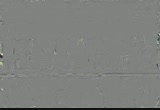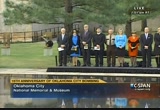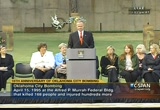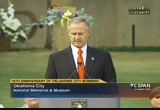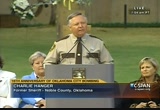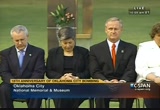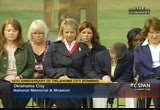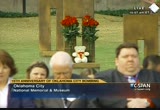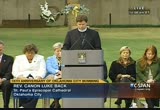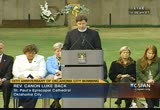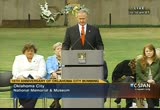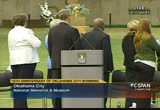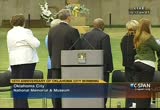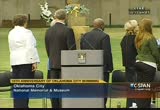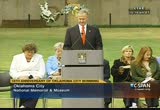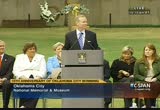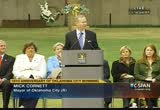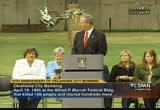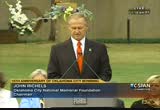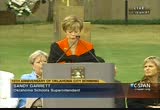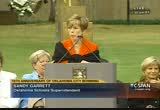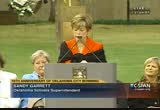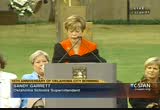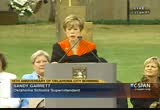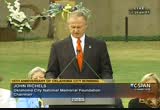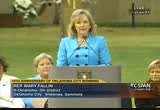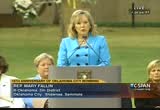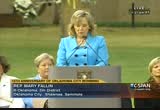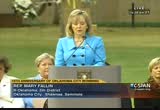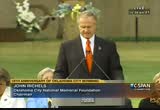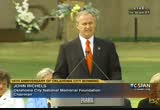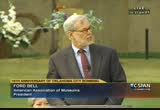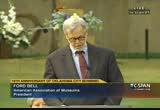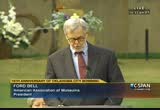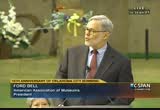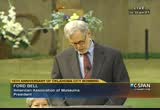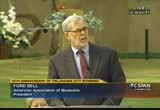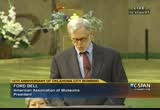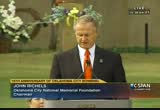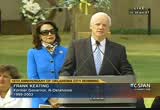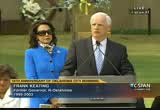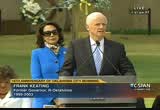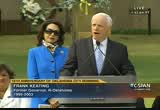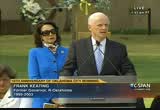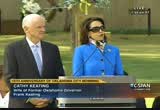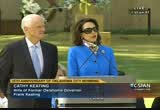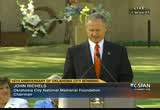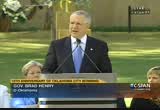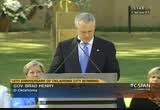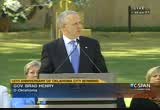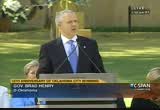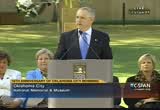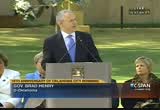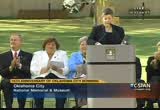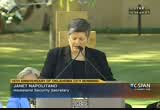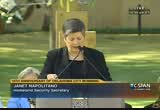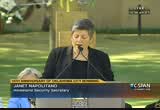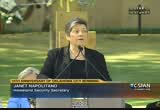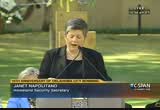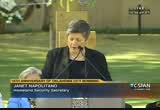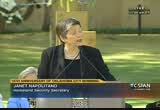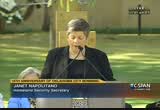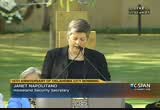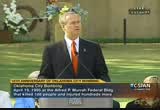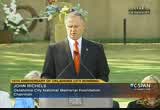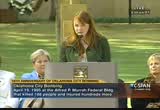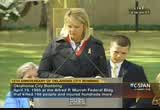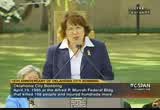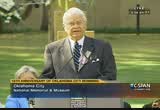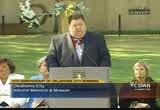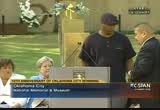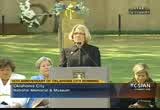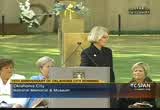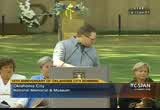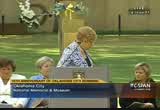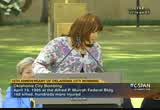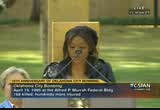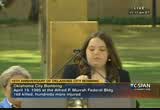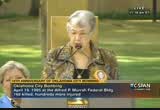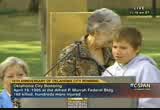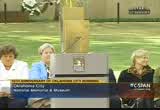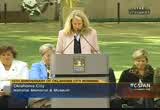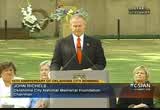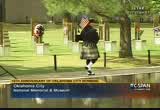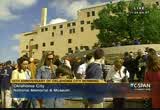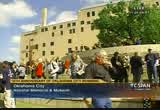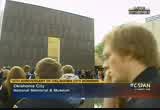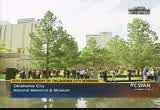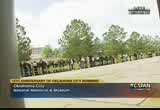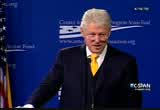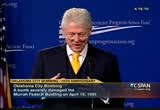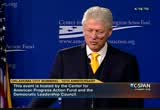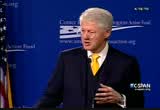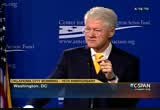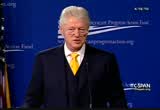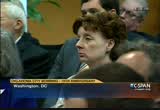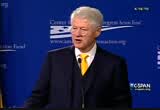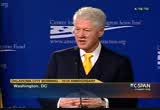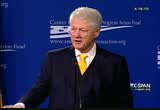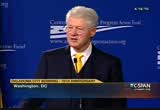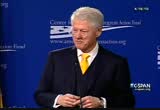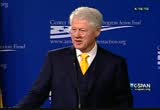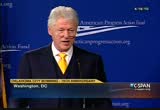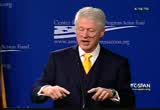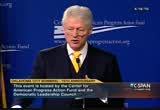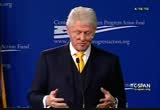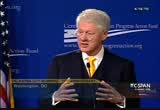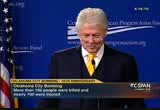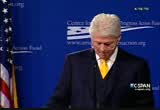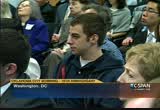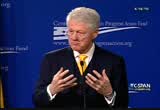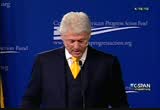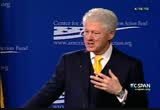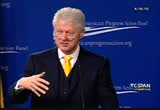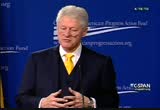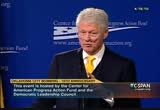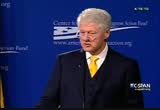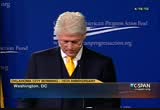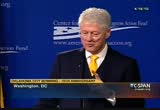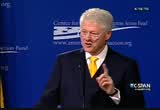tv Today in Washington CSPAN April 19, 2010 10:00am-12:00pm EDT
10:02 am
special guests with us. we have secretary janet napolitano, governor brad henry and first lady came henri, lt. gov. henry ash cans, nick cornett, sandy garrett, congresswoman mary phelan, ford bell executive director for the american association of museums , governor frank keating and cathy keating. anthony russell,. robin and again, regional administrator region eight. thank you all for joining us on this important day. 15 years ago, april 19 began as a beautiful day.
10:03 am
however, the beauty we enjoyed on that day was erased in an instant at 9:02 a.m. in the hours that followed, hundreds, even thousands of people rushed in to help us. just doing their job, they would say. however, in doing so, they became heroes to all. one such hero who was just doing his job was patrolling interstate 35 near perry, oklahoma when he noticed a car missing a license plate and he pulled the driver of the car over. his actions on that day was the first that to bring justice to the perpetrators of the events that occurred on the site. that trooper is here with us today. please welcome retired oklahoma highway patrol trooper and current noble county sheriff charlie hanger.
10:04 am
10:08 am
almight god, 15 years ago, a terrible, dark fantasy exploded in our faces. this ground has been sanctified by the blood of your children and many different people that we knew and loved. today, we feel the way you made us to feel. oh, lord, just as this moral has beautified the death and destruction we have shared, we pray you will help us take all the fragments and broken pieces of our lives and make something beautiful of of them. we thank you, god, that you
10:09 am
continue to be faithful to us. we thank you for raising up children of light, a courageous rescuers, and first responders, generous givers and patient teachers, and all those who have given strike officially to secure this monument, to restore our city, to renew our state, and to protect our nation. as we move through the gates of this memorial time together, as we experience the valley of the shadow of death than gold beside the still waters -- migled beside the still waters, may our souls be restored by the rising sun. maybe leave here with an awareness that you remember us
10:10 am
10:14 am
>> please be seated. i think you to the united states air force band mid- america from scott air force base in illinois, and to our neighbors and friends from tinker, illinois, for hosting our friends and guests. our city has certainly change in attitude and appearance. and during the last 15 years we have worked together with common resolve to defeat evil attack against us. we constructed this beautiful memorial and the compelling newseum to the ground of the attack.
10:15 am
the rebuild heavily damaged box around the site. today, we continue our work building and even greater oklahoma city. now please welcome the mayor of oklahoma city, the cornet -- mick cornett. [applause] >> as john mentioned, april 19, 1995 began much like today. the temperature was seasonal, the sun came out, and then our lives were changed forever. ultimately, each of us, individually and collectively, have been faced with choices, the choice is between strength and the uncertainty, the choices of optimism and pessimism, the choice is between freedom and
10:16 am
fear, choice is between moving forward and falling back. and we have made our choice is collectively and individually. we have chosen to track. we have chosen optimism. we have chosen freedom. and we have chosen to move forward together with a level of unity that is unmatched in any american city, as it to be expected because our experiences are like no other. i do not know what this site looks like from that side of the pond this morning, but i can tell you what it looks like from over here. it is among the most inspiring i have ever seen. it seems a little surprising,
10:17 am
maybe it should not be, but the further we are removed from that day in 1995, the crowds seemed to swell. ultimately, this remains an event that should be remembered not because we cannot forget, but because we choose to remember. [applause] >> thank you, mayor. we are all proud of our city and are thankful for what you do. as we approach our 15th anniversary, leadership recognizes the need to ensure that this story, your story, our story, would be taught for generations. in the earliest days of design and construction of the memorial, those working on a project often discussed the fact that some day we would need to teach students who were not even born about the events that
10:18 am
transpired and lessons that we learned. that time is here. that is why our staff sat down with the state superintendent of instruction sandy carroll and began the work to ensure the story of the oklahoma city bombing a the lessons learned are taught as a permanent part of oklahoma's history. of course, many teachers were already leading student field trips to this site, utilizing the memorial programs and lessons plans in their classrooms, but there was no formal plan for that teaching. this morning superintendent garrett joins us with an update on those efforts. [applause]
10:19 am
>> thank you. it is my privilege to be here today with honored guests on the stage to announce that, yes, our children will learn forever about this event and the way the oklahoma people came together. 15 years ago we began an educational journey that we would have never imagined before that moment. a single point in time that now brings us all to this place in our collective history. and just moments ago, throughout the state of oklahoma, our school children and joined us in 168 moments of silence. [applause] since 9:00 03 a.m. -- 9:03 a.m.
10:20 am
of that morning, teachers have been reminding us of that terrible event. many of them have traveled to field trips. teachers on that day, in those weeks to come, offered comfort and assurance, a shoulder to cry on, a hog for a lost one, and help to understand that which would have been unimaginable. yet a new generation of oklahomans cannot actually remember what happened here. so we have taken the steps to ensure all oklahoma students will always be talked about this historic event and the lessons learned from it, and the history of our state, nation, and our world.
10:21 am
in the months and years following the bombing, oklahoma educators and curriculum specialists, community leaders, and others, began working with the national museum memorial staff to develop less than planned. these plants have been further developed and refined throughout the years, and the partnership will continue with new teacher resources being created this year. fine arts, music teachers, counselors, and others from elementary school to high school will continue to develop those lessons and make certain it is their primary every school year. we have also been joined by educators from throughout the united states of america. we have shared those materials with them. as chair of the state board of education i was proud earlier when we began this rule making
10:22 am
process to officially add these events to the core curriculum content to the state curriculum and to relevant past standards. on april 6, i was honored to join the national memorial staff and we represented several representatives for the signing of house bill 2750, approving the requirement for all students to study the oklahoma city bombing and its aftermath. [applause] the legislation also requires the and then be included in the state adopted textbooks for oklahoma, u.s. history, and world history. and also working with the
10:23 am
memorial to provide additional teaching resources. many of those are available online for everyone here and four classrooms throughout the world but we also plan to create a virtual field trips to the memorial and museum, so students from all over can experience the power of this place, and its place in our history. the action, as well as new state law, gives the bombing at the murrow federal building is a place in history as well as how the people of this state came together for ever after. thank you. [applause] >> thank you, superintendents garrett.
10:24 am
thank you also to gov. henry for making this dream a reality. we believe educating our children to the senselessness of violence and terrorism, and shoving first and the high price to be paid for those actions helped to shape a better future for all of us. this morning we are also joined by one of our oklahoma congressional leaders who is serving -- was serving as a lieutenant governor 15 years ago. she brings with her at a resolution from the u.s. congress. please welcome congresswoman mary phelan. [applause] >> good morning. secretary napolitano, gov. henry, mayor cornett, other distinguished guests, and it is my honor to have introduced a special resolution in the conference co-sponsored by our
10:25 am
entire congressional delegation. it reads, resolution, remembering the victims of the attack of the federal building in oklahoma city, whereas on april 19, 1995 at 9:02 a.m. and terrorist that needed a truck bomb at the federal building in oklahoma city. whereas this is one of the worst attack to ever occur on u.s. soil, taking the lives of 100 to eight people and injuring more than 150 others, many of them government employees working in the murrow federal building, and where this cowardly act of domestic terrorism horrified millions of people across the united states of america, and whereas the people of oklahoma and the united states responded to the tragedy through the remarkable efforts at the local,
10:26 am
state, and federal personnel, firefighters, public and private medical personnel, and other emergency service personnel, and thousands of volunteers from the committee to save lives, assisted the injured, wounded, provided meals for those who came to oklahoma city to offer assistance, and whereas this courageous response says what has known to become the oklahoma standard which was later emulated by many americans following the terrorist attacks in september 11, 2001, and where s following the attacks, the people of oklahoma and the u.s. pledged to build and maintain a permanent national memorial to remember those who were killed, those who survived, and those changed forever. whereas this pledge was established by -forming the
10:27 am
memorial which attracts thousands of visitors every year, and whereas the inscription on the wall of the memorial reads we come here to remember those who were killed, those who survived, and those changed forever, may all you leave here know the impact of violence, made this memorial offer comfort, strength, peace, hope, and serenity. and where as the murrow federal building has been replaced with a safe and secure functional building in downtown oklahoma city that houses many of the offices that were once and number of building, sending the message to the people and government of the united states that we will be not -- by terrorists. and whereas [unintelligible]
10:28 am
therefore be it resolved that in the house of representatives that we join the people of the united states in sending best wishes and prayers to the families, friends, and neighbors, of the 168 killed in the bombing of the borough building in oklahoma city, and said its best wishes and prayers to those injured in the bombing can express gratitude to the thousands of responders, rescue workers, medical personnel, all volunteers from the community and across the nation who answered the call for help on the morning of the attack and the weeks and months thereafter. be it resolved on this day, signed by the speaker of the house of representatives of nancy pelosi. if i might, i have the resolution to present to you. >> thank you. [applause] >> may god bless oklahoma.
10:29 am
>> thank you, congresswoman fallin. thank you for introducing this to congress and for presenting tthis to us today. in 2006, the memorial museum finished a rigorous accreditation are -- progress to join other nationally recognized museums to meet these high standards to meet the american association of museums standards. as we've maneuver through the degradation process, peers and evaluators would tell us what we do at the memorial museum is, in many respects, unique to the museum world. we recognize and take seriously that many of you have entrusted to us precious and personal artifacts that help tell the
10:30 am
story of what happened here. these important personal possessions help our museum remain compelling and personnel to the millions of visitors and help them a light not only to the events that transpired on that day but to the people who were affected. these possession to humanize the high price of terrorism and create a living memory of your loved ones and human story that unfolded on april 19, 1995. now please welcome the president and chief executive officer of the american association of museums ford bell. [applause] >> thank you, john. good morning to all of you. thank you for inviting me to be here with you on this solemn day of remembering, and day of
10:31 am
remembered for oklahoma city and for our entire nation, a day that we are all called to reflect on the lessons of unfathomable hatred and sentenced -- senseless violence. there are some 17,000 indians in the u.s., institution that interprets and preserve america's great cultural and historical creative heritage is. of the man seems, only 775 are accredited. accreditation is the highest recognition that a museum can achieve in the united states. the oklahoma national memorial in museum is, as you have heard, one of those 775. but on this day, this museum is the most important museum and the most important memorial in our country, and on any day, is
10:32 am
a museum which should be seen by all americans. we know museums as collecting institutions, works of art, artifacts, and historical documents, but museums also have the task of collecting and preserving the memory. honoring and passing that memory down to our children, and to their children. museums are stewards of the spirit of the conscious of what has become -- what has come before us and too often what has passed from us for ever. the collection of the oklahoma city national museum some 1 million documents, artifacts, and photographs ensure we will never lose the memories or lessons of that horrible day april 19, 1995. what this stunning and
10:33 am
unforgettable moral and museum old and preserves is a sacred memory of the men and women and children who died or maimed in this tragedy. the wives and husbands, sons and daughters, grandchildren, friends and neighbors and co- workers, students and teachers, first responders, and the members of this community. what greater good can a museum offer us that this act of preserving the memory and spirit of these people? in his 1984 essay, roger rosenblatt wrote an essay entitled do you feel the death of strangers?" he wrote, "there may not be two kinds of crime in the world but there seems to be two kinds of sympathy. one that weeks and disappears, and one that never leaves the
10:34 am
watch. said that they come on like pity, must have some application to the future. if we do not feel deeply the death we are powerless to prevent, how would we be alert to the deaths we might put an end to? " museums and moral sites like this one help us to keep that watch. it is impossible to visit the museums that dearly plaza in dallas or at the lorraine motel in memphis without the spirit of the leaders slain hair touching you on the shoulder, during your memory with their score in rhetoric, urging you to go forth with faith and hope, urging you to remember, to feel deeply those deaths we are powerless to prevent. museums have the capacity to transcend time and space.
10:35 am
not far from my office in washington is the holocaust museum. it is a sobering place, like this one, and there is an exhibit that grips all who visit the museum. that is the shoes. issues that are systematically and allegedly taken from prisoners. shoes that were taken from people bound for a terrible fate. more than any other piece of evidence collected by the museum, these thousands of shoes are the objects that speak to us across time that recall for us the people who once wore those shoes, the men walking to work, women in their homes, children at play. an engraving on the wall at the museum reads in part, "we are the shoes, we are the last witnesses."
10:36 am
there are issues in the collection here as well. these 168 shares, let the shoes of the holocaust museum, bear witness. each one asking us to remember. i am listening to these chairs right now come as are all of you, and all who will come here in the future. i am listening to ted allen, patricia nix, and to the others, and in doing so, we are all part of that great loss. we are on watch. what greater good can a museum offer us then this act of watching over the memory and spirit of those who died here, who they were, what they meant to us, and what their absence
10:37 am
means now this day and every day to those of us still here. eventually, something must fill the silence that comes with loss, especially a loss of this magnitude and degree of tragedy. the oklahoma national memorial in museum provides a place where we can begin to fill that silence. this place resonates with voices able to express hope for a future that will be free of the violence and hatred that this community had to indoor one day in 1995 -- endure one day in 1995. never forgotten. these are the lessons. the priceless artefacts of hope. that this museum and memorial
10:38 am
preserved for us all now at forever. thank you. [applause] >> thank you. we are honored to have you here with us and we are grateful for the commission of this museum. 15 years ago, our state was led by a couple who was in office for only 100 days but they let us through our darkest hour. the standard we set as a community is still known across the nation and across the world as the oklahoma standard. please welcome home gov. frank keating and mrs. cathy keating. [applause]
10:39 am
>> thank you. the oklahoma standard, you know it when you see it, but is not easy to find a precise definition. it represents a plethora of cultures, families, backgrounds and nationalities, people from all over the united states, all over the world, but on april 19, 1995, it was established first and foremost as a standard of love and commitment and brotherhood. all of us who were there, who love their neighbors and friends, and who are committed today to those who survived will never forget, and we will be, as
10:40 am
long as we live, supporteive and committed to the 168 that were lost and to their families and loved ones. but why is there an oklahoma standard? first, we prepare for natural disasters here. unfortunately, this time of year is tornado season. so it is incumbent on all of us to have competent, professional leadership. firefighters, rescue workers, police officers who will help us at the time of the natural disaster. and thank goodness that on april 19 the family of first responders, police department, highway patrol, national guard, fire service, the merged into responders -- we have highly gifted deskilled people in charge.
10:41 am
we did not have brothers in law, political friends, we were not paying political deaths by giving people titles and positions. . as a result, we survived. but there is more to it. we have a sense come at as a people, of honor and commitment and integrity and decency, sorrow and joy, all the emotions of life, working together, living together, praying together as a community. so we had the salvation army, read cross. we had catholic charities, the excellent professionals from the southern baptist community. everyone came here. they provided meals, assistance, any time anyone
10:42 am
asked for something, they would give it to them. they would say, do not ask for batteries because they will bring you a truckload. just ask for three. i remember somebody showed me a dollar bill asking me what this is. i said, i am in politics, i recognize money. he said, this is not just any dollar. this is an oklahoma dollar. this is the same dollar that i brought here and i am leaving with the same one. what an incredible community oklahoma is. [applause] lastly, it is the spirituality of our people. yesterday, we celebrated the lives that were lost near here at the first christian church,
10:43 am
where the families were first taken th. the methodist church to my right is where those who were covered were taken. this was our commitment from minute one. that is what all of us are so closely stitched together, in brotherhood and hope, because of of a time of evil, good comes. i am so proud to be an oklahoma an. [applause] >> the oklahoma standard was in place in our communities and with our neighbors from the earliest times, from the land run through the booms and busts of our state. but it was during the rescue and recovery that the oklahoma
10:44 am
standard was first seen and experienced by people all over the world. it was then that it was noted and received its name, and was given a standard of measurement for all other acts of violence or responses to any kind of community disaster to be measured. it was a level of excellence that was not only from the professionals, but from the community, citizens, neighbors and friends, who gave their time and spirit, their love, their prayers, their efforts to help us get back on our feet. just four days after 9:02 when a community came together through volunteerism and put on a prayer
10:45 am
service for the families, and it comes, rescue workers, to share our faith, hope, and love. it was experienced by thousands and thousands -- accompanied by thousands and thousands of roses sent here by florists from all over the state, to be given to the family members to show that we were sending our love, to show that they were in our prayers. it was given by all the people who had brought teddy bears, flowers, letters, memorabilia, and left them on the fence, and continue to do so today, because they shared in our grief. the spirit of oklahoma has left an indelible mark, not only in
10:46 am
the hearts and souls of each oklahoman, but in many across the world. [applause] >> thank you very much. when the keating's left office, we were, and have for the last seven years, been blessed by the leadership and support of governor brad henry and first lady can henry. together we carry on the memorial mission and recognize our role as guardians of this memorial. please welcome governor brad henry. [applause] >> at this place 15 years ago today, the lives of all
10:47 am
oklahomans, indeed, all americans, were changed forever. today, we gather at the sacred ground, as we do each april 19, to reaffirm our vow to never forget. and the evil perpetrated here illustrated the depths of human depravity. but also occur here came to illustrate the best of humanity, the love and compassion, decency and generosity and warm spirit of our people. as we always do, oklahomans that tragedy with a triumph. from such a horrible crime came tales of the astounding goodness. from the rescue and recovery workers who gathered here from
10:48 am
across oklahoma, across the nation, and across the world, to the gift, both large and small, that poured into oklahoma city, to the impromptu tribute and memorials left at the chain-link fence only a few yards away, the aftermath of april 19 actually came to show the innate goodness of humanity. the stories and lessons of that fateful day are many. in one instant we learned of the destructive power of hatred. in the next, we learned of the healing power of love and faith. those are lessons that we shall not forget, nor shall we forget the 100 texted 8 -- 168
10:49 am
oklahomans who died here, or the numerous others seriously wounded. i commend the national memorial and its supporters across oklahoma and nation for preserving those memories, both horrific and hopeful, of that day and the weeks that followed. earlier this month, as the superintendent pointed out, i signed a measure to ensure the oklahoma city bombing is included in the curriculum of all oklahoma students. students entering high school this year were born after 1995, and we have a duty to ensure future generations remember those lost and injured here. that they understand the lessons
10:50 am
of this vital part of our shared history, to ensure love and goodness shall continue to prevail over hatred, and that similar atrocities can be prevented in the future. pslam 46:5 tells us that god is in the midst of the city, it shall not be toppled. by the very grace of god, we oklahomans concord evil with good. we overcame despair with hope. we will continue to honor those taken from us, and we will continue to build a better community and state by building on the goodness and hope that springs from these sacred grounds.
10:51 am
the oklahoma standard is not a past event, it is part of the character and fabric of the people of this city and state. god bless us all. thank you. [applause] our special guest and keynote speaker this morning is certainly familiar with our tragedy and triumph. in 1995, debt napolitano was serving as the u.s. attorney in arizona and had a hand in the federal investigation of the oklahoma city bombing. three years later, she was elected arizona's attorney general. and in 2002, she was elected as the third female governor of arizona.
10:52 am
under her leadership, arizona created one of the first state homeland security agencies in the nation and opened the first state kate -- counterterrorism center. janet napolitano was also the first woman to chair the national governors' association, where she was a driving force behind the creation of the public safety task force and homeland to charity advisers' counsel. it is no wonder then that president obama selected the governor napolitano to be this nation's third secretary of the department of homeland security. secretary napolitano is passionate about the safety and to carry all u.s. citizens and she is a staunch defender of justice for all. i have been fortunate to work with her during her service,
10:53 am
both as governor and as homeland to carry -- homeland secretary. i would add, from personal experience, she is a pretty cool person. i am pleased that she is with us today. please help me welcome secretary of plant security janet napolitano. -- homeland security janet napolitano. [applause] thank you, governor. good morning. i am humbled to be here this morning to mark the solemn anniversary and to honor the 168 live taken from us now 15 years ago in an unspeakable act of terrorism. we honor the survivors, friends and family members, who continue
10:54 am
sense of hope and of strength and spirit inspires all. we honored the first responders who risked their lives are rushing into the marrow building in an act of selflessness, reminiscent of those we have seen since in the response to 9/11, after the fort hood shooting, and in daily acts of heroism that do not often make the daily news. we honor the continued need for vigilance against the violence ideologies that led to this attack, so that we can recognize the signs in our communities and stand together to defeat them. above all, we remind ourselves that what defines us as a nation, as a people, and as communities, is not at how we have suffered, but how we have risen above it, how we have overcome. the history of oklahoma city will not be written by this
10:55 am
attack as this memorial in museum the tests, this city and its people will be written by what came afterward, and what is yet to come. by the tremendous outpouring of community support that became known as the oklahoma standard. by the amount to rescue and relief operation which included support from over 12,000 federal and state and community participants, including 665 fema employees. by the difficult lessons learned about our defenses against terrorism and to improve how we protect the country. and by the on waiver determination to seek justice for the perpetrators of this crime. as the governor mentioned, 15 years ago, i was privileged to help lead a portion of criminal
10:56 am
investigation into this attack, serving as the u.s. attorney for arizona. in arizona alone, 150 agents were assigned to the case. for a full six weeks we maintained a command post in kingman to insure that every legal tool available to us would be used to support the investigation. i wish it were possible for me to stand here and say that the threat of terrorism and violent extremism have since gone away, but we know that is not the case. indeed, in the 15 years since this attack, the reality of terrorism has come home to us again, and our adversaries continue to look for ways to exploit our openness and to take innocent lives. we have not shed the reality of domestic violence, extremism,
10:57 am
nor of terrorism. fema, now part of homeland security, when they joined the effort in 1995, my department was still years from being formed. but today, our first priority remains protecting against and preventing another terrorist attack on america, and we have learned from this tragedy by continuing to implement and define the security standards and procedures developed since 1995. in fact, just this week, an interagency security announced new security standards for all federal buildings and facilities. our federal protective service announced a broad deployment of a new risk assessment tool to help their inspectors keep their more than 9000 facility secure.
10:58 am
we will continue to work day and night, and we will continue to constantly ask ourselves if we are doing everything we can to prevent another terrorist attack, but making prepared as a part of our culture will ultimately draw on the innovation and civic spirit of the american people. and our nation has never lacked for that. we cannot put a glass dome over our country. we cannot guarantee there will not be another attack, no one can. but we are a strong and resilient country. we can resolve that even successful attacks will not defeat our way of life. we can resolve that the oklahoma standard becomes a national standard -- the national
10:59 am
standard. [applause] we can target our resources against the emerging threats and a balding risks, and we can work to better empower the public and draw what president obama has called our greatest national security asset, our values. it is those values that define us as a nation, and it is those values that will always be a force against the powerful and dangerous ideology of a few appeared our nation has faced violent extremism before. we have witnessed terrorism at home and abroad, we can do so again, but in big ways and small, resulting in is a pillar of our security, and there has never been a better example of that man right here in oklahoma city. we have seen that kind of resilience again and again.
11:00 am
it from the passengers who took matters into their own hands on the september 11, and indeed again, the passengers who took matters into their own hand on december 24. we have seen in the citizens of new orleans reclaiming their community after katrina. and in greensburg, kansas, rebuilding their account after it was destroyed by a tornado in 2007. . .
11:01 am
>> terrorism is a tactic designed not just to kill, but to make us feel powerless. but we are never powerless. we control the way we prepare ourselves, the way we combat threats, and the way we respond is something indeed happens. america is a strong nation, a resilient nation. as we confront new threats, we will use our values and way of life as the most powerful forces of our strength. we will do this for now and for years to come. here, at the memorial, there is
11:02 am
an description at the survivor treated reads -- "the spirit of this city and this nation will not be defeated, are deeply rooted face sustains us." this is wisdom to me. it describes perfectly that intangible quality that whenever challenges we face, we will respond, we will persevere, we will continue to thrive, and our families and communities and across our nation. thank you. [applause] >> thank you, madame secretary. we look forward to working with you as we move forward and appreciate your leadership in this important area. thank you for making this trip a priority with your busy schedule.
11:03 am
today, as we have been on this site remembering, others across the country have gathered as well to pay respect, to bring awareness, to remember, and to educate. just five hours from here in downtown little rock, the designers of this outdoor symbolic memorial have gathered at the clinton presidential park with families and survivors who call arkansas home. with more than 100 other people , the 168 names have been read in an exhibit entitled "leadership in a time of crisis" which our staff helped to design in collaboration with the national archives and the clinton foundation staff and is open for viewing at the clinton presidential center and will remain open through memorial day.
11:04 am
this past weekend, president clinton led a panel in washington dc, looking at the lessons learned in oklahoma city. as you know, we will honor him on wednesday night with our sixth annual reflections of hope award for his help in rebuilding the city and the work he has led around the world to bring hope in the midst of political crisis. also today, as we gather here, sailors aboard the uss oklahoma city have raised a special american flag and have observed 168 seconds of silence in honor of this 15th anniversary. the ship's commander will send us that flag to be retained here at this museum. [applause] now comes the most important
11:05 am
part of the ceremony, remembering the 160 people were killed. as is our custom, we ask everyone please wait until all names are read before standing. thank you. >> we remember our friends and family in the oklahoma water resources board building. [reading names] the job corps. [reading names] my mother, a rescue worker.
11:06 am
11:07 am
11:08 am
11:10 am
11:11 am
family in the u.s. customs, floor. -- fifth floor. [reading names] >> we remember our friends and family in the department of agriculture on the fifth floor. [reading names] [reading names] we also remember our friends and family from the u.s. army recruiting battalion on the fourth floor. [reading names]
11:12 am
11:13 am
11:15 am
11:16 am
11:17 am
11:18 am
11:22 am
>> thank you, all. and thank you, ladies and gentlemen for being with us today. your presence means a lot on this 15th anniversary. we invite you to visit the museum. admission is complementary today. at 1:30, secretary nepal, will participate in a panel discussion with the editor of "time" magazine and a journalism professor to discuss the media's role in covering terrorism. thank you again for being here. [applause]
11:28 am
11:29 am
after oklahoma city. >> that is the first time i have seen that film. i'm going back to oklahoma and they're having a 15-week-long observation of the 15th anniversary. it seems as real to me as if it happened yesterday. there was a story in this "in new york times today -- "new york times" today by reporter
11:30 am
who has been positively interested in this. drawing parallels to the time running up to oklahoma city and the political discourse that exists in our country today. that is a legitimate thing to do. but i think it is important, before we overdo that, to put this in the context of what happens. try to understand what happened then and what it meant for america and what it should mean to all less in the way we exercise our citizenship. before the bombing occurred, there was a fever in america in the early 1990's. there was a time of dramatic upheaval. a lot of old arrangements had changed. things that anchored people
11:31 am
lives and give certainty to them had been unraveling. some of them, by then, for 20 years. median family and come began to stagnate and inequality in our country began to increase going back to the early standard when it went off the gold standard and wheat -- early '70s when we would of the gold standard before we had any kind of global compaq or adequate response to it. there were huge numbers of americans who were working longer hours for lower in comes. more and more families under enormous economic stress. meanwhile, the fabric of american life had been unraveling. there was a lot of violence in our cities. there was a rise of gang violence in particular and people putting political spin on some of the things the gangs
11:32 am
were doing. the structure of the world we live been, we knew where our friends and enemies were in the cold war, in that clear, bipolar world, itself was coming to an end. oklahoma city was a few years after the fall of the berlin wall. there was no simple, bipolar world anymore. there were just a lot of fistfights around the world based on ethnic and religious and cultural and political and longstanding geographic grievances. but it was hard to get hold of anything. we moved from the cold war to an independent world full of positive and negative forces. we moved from an industrialized economy that built the greatest middle-class in history into an information age that open vast new vistas and open -- and post
11:33 am
all kinds of new problems. more and more people had a hard time figuring out where they fit in. more and more people had a difficult time living with confidence and optimism in the face of change. it is true that we see some of that today. since this country was born, in reaction to the abuse of power by the government, if you remember, that's with the boston tea party was about -- it was about note taxation without representation. it was not about representation by people you did not vote for and did not agree with but can go out in the next election. -- but can vote out in the next election. part of being american has been banging away at the government.
11:34 am
when i was a young man in politics in arkansas, and the time the federal government did something we did not agree with, we would have the standard saying that it was the only institution in america that can mess up a two car parade. everybody said stuff like that. but in the decade of the '90s and beginning in the '80s, there was a run-up of much more serious demonization of the government and its employees and an effort to legitimize violence. it was something in my lifetime i have experienced first as a young southerner growing up when people were saying it was ok to use violence against government. people were trying to promote equal opportunity and racial integration. then for a brief time, the only
11:35 am
time in my lifetime, in the late '60s and early '70s, the idea of legitimate violence against the federal government and its employees seem to be the province of the left with the rise of the weathermen. many of you or at least there are a few of you who are old enough will remember that. by the 1980's, we began to have the rise of violence from a french i suppose you could call right wing, but it was basically an critical hatred of the government and believe all taxes were illegitimate. in the 1980's, two of my personal friends were murdered in arkansas. one with a share of the lead in my county coordinator in a rural county in northeast arkansas because he was charged with working with federal officials to lead the effort to capture a
11:36 am
tax protester who had moved from idaho to northeast arkansas and was extremely well armed. in the shootout, he killed my friend. there was a young african- american state trooper who just by accident, doing his job stopped a man in a van and had an entire arsenal in the van and he did not want to be apprehended, so he killed this young man who buy new. -- whom i knew. not long before i took office, there was the incident at ruby ridge. in 1993, shortly after i took office, with the first world trade center bombing which involved people from other countries, but also some legal
11:37 am
immigrants and it was our first experience of international terror on our soil. then we had we go -- then we had waco. there is no question that david koresh believes he had the right to create an army encampment and use violence against the government will and do things in that encampment, particularly with children, that were illegal and unconscionable. but the sense was waco panel review ridge were somehow not the fault of those who are advocating violence, but the government that was attempting to enforce law. so it became symbolic.
11:38 am
this was all going on. a great up rooting in america. people feeling disoriented. i will never forget a young woman who helped me understand this. she was a 17-year-old high- school senior in am sure when i ran for president. new hampshire and one of the worst economies in the country at that time. she introduced me to parents. her father told me i cannot look into the face of my wife and children at dinner anymore because i feel like a failure. this sense of loss of incapacity, and but this -- of impetus makes people vulnerable
11:39 am
to the siren songs of simple and but -- simple explanations, wanted the world to make sense again. there was a rising movement in the early '90s that was basically not just a carefully orchestrated plot by people of extreme right-wing views, but one that fell into fertile soil because there were so many people for whom the world no longer made sense. they want a simple, clear explanation of what was inherently complex and a mixed picture full of challenges that required not only changes in public policy, but personal conduct and imagination about the world we were living in. demonizing the government and the people who work for it sort
11:40 am
of fit that. many people were in the business back then of saying the biggest threat to our liberty and the cause of our domestic economic problems was the federal government itself. we have to realize there were others who feel this both because they agreed with that and because it was in their advantage to do so. when i became president, it's hard to remember this, there were only 50 sites on the world wide web. have been more added than that since i have been talking. it exploded in my first term as continue to explode ever since. among those who first sought its potential and made use of it were those who used the internet to do interesting things, including share information on how to make bombs. we did not have blog sites, so
11:41 am
the instruments of carrying this forward for right-wing radio talk show hosts. they understood in motion is more powerful than region -- more powerful than reason most of the time and it helped they got more listenership and advertisers and commercial success if they can't people in the white heat. for 99% of them, it's just that. turn on the radio, listen to somebody says something you agree with, then your anger, go on with your life and make the best of it. but it shaped the environment in which we were in. another thing that needs to be stated is -- something that is different from the current situation is, when i took office, americans were literally still divided over the issues
11:42 am
that divided us in the 1960's and 1970's. we were still divided over how to view the civil rights revolution, how to view the vietnam war, divided over the meaning and implications of the women's movement. we were still fighting about abortion and all the other issues that flow out of it. into that combustible mix came in the late '80s and early '90s, a fresh debate over gay rights and what that meant. a lot of these battles that played out that were symbolized by me and speaker gingrich, but involve millions of us, were an attempt to finally reconcile where we were going forward on all these issues. i got a very moving letter from robert mcnamara bride before i
11:43 am
was inaugurated. all of you know, he was president kennedy and president johnson's secretary of defense, a big proponent of the vietnam war and then changed his mind and spend the rest of his life apologizing for it. he wrote me a letter saying the vietnam war ended with my election. for some people, it did. i have on my wall, in harlem today, a framed case i had on the wall in the white house of the battle models of vietnam veterans who gave them to me at various stops on the 1992 campaign to say they supported the fact i opposed the war and they would support me. but the war did not end with my election. it entered a new phase. a lot of this current operating was overlaid by the unresolved
11:44 am
issues of the '60s and '70s. and aggravated by the new ways people had of communicating both through radio talk shows and the incipient internet networks. in the two years after the world trade center bombing and after oklahoma city, we have worked hard and largely on a bipartisan basis to begin america's effort to protect ourselves against terrorism better. there were a number of things that were done, and one thing i thought we had done that we learned of 9/11 which was not done, which was requiring senior executives to cooperate more closely and share information. i did not know since, believe it
11:45 am
or not, before 9/11, the president was not supposed to know what was going on in the fbi and was supposed to stay 90 miles away from it. both agencies had essentially honored that order. they had anomaly -- they had nominally transferred people, but a lot of other things have happened. law enforcement officers had already succeeded and returning terrorists to the u.s. for trial and prevent attacks to the holland and lincoln tunnels in new york. in an attempt to continue this, i sent legislation to congress a couple of months before oklahoma city to ask them to further strengthen our capacity to prevent and counter terrorist attacks. it was making its way through.
11:46 am
meanwhile, a young man none of us knew then named timothy mcveigh had made up his mind to take a different course. on the anniversary of waco, which has become symbolic to people who see government as a problem, he drove his fertilizer truck which had been turned into a giant chemical weapon up next to the murrah building and exploded and the concuss of the fact brought a building down. people had just come to work for the day and you have already heard an account of what happened. it is worth noting again at 168 innocent people were killed. mothers, fathers, sons and daughters, good neighbors and good citizens. one of them was a secret service agent who i still think about all the time. he was on my presidential security detail and he wanted
11:47 am
tickets family to oklahoma city because he thought it would be a wonderful place to raise his children. out of the hustle and bustle of washington, a safe haven of almost idyllic upbringing in america. 300 buildings were damaged. 30 children lost both parents. 170 children lost one parent. 19 children themselves were killed. in the immediate response, there was an amazing set of facts of humanity and heroism. and that i later recognize that the state of the union was a 49- year-old vietnam veteran who worked for the social security administration. he was there when the bombing occurred. he got out and that one back into the building where things were continuously falling. i think he felt three or four floors and it may have saved
11:48 am
your life, but you did. he went back and to save the lives of three women. first responders rushed to the scene to try to make sure no one in the immediate area got hurt. fire rescuers dug through the rubble to pull survivors for days. i said the crisis management team under the fbi and declared oklahoma a disaster and cents fema to assist. then firefighters and people from all over america just began showing up to help. people came from new york to help. i will never forget, after 9/11, we lost firefighters here. i was at a memorial service and a guy came up to be from oklahoma city saying i came here because they were there for us.
11:49 am
america stood with the people of oklahoma city. maybe the most important letter i got from all the letters i got was from the one that you quoted. the whole issue is how is the city, how will the state, how will victims respond. the nation was pulling for them, wondering what they would do. essentially, the pan am 103 widow told them that was ok to keep on living. the only with a that honor their loved ones is to keep living life and to what they're lost loved ones would have done. it was better than anything i could have said and she had more credibility in saying it. i think it helped not all the victims and their families in
11:50 am
also helped everybody else. after oklahoma city, what happened? at one level, we did rational things. i went back to congress and ask them to. bob dole was great. we had a real sense of bipartisan mission. we disagreed about whether chemical tags should be put in fertilizer, but as a scientific matter, it is hard to do anyway. we did not abolish all our disagreements, but there was a sense that this is something we had to do together. that is exactly what happened. i propose measures to increase
11:51 am
law enforcement officials solely dedicated to fighting terror. eight center to gather every i asked for the approval of military experts who were prohibited from participating in law enforcement to be involved but threats of the involved chemical, biological, or nuclear-weapons. one of law enforcement to be able to attract money trails and have the same rules that apply to organized-crime figures for electronic surveillance apply to terrorists and those selling explosives for use in a terrorist incident. for attacking members of the uniformed services. congress passed this bill in seven weeks with strong bipartisan support. i can tell you that while we had 9/11 and had a lot problems
11:52 am
sense, that legislation helped. in my administration and president bush paused administration, it awarded several serious terrorist attacks. to this day, -- get thwarted several serious terrorist attacks. today, the defense, after oklahoma city, the ones provided by federal employees who are not known to anybody who have chased the money and chased the suspects and try to scope out the facts. it is also important to note that oklahoma city changed the country in other ways. we did not stop our political fights. i kept fighting with newt gingrich and the public -- and the republicans showed the government down twice at the end of 1995. everything did not turn into sweetness and light.
11:53 am
but as tough as it was, it was different. i will tell you an entirely personal story. you saw the governor talking -- frank is a very conservative republican who by coincidence of history, was a president of the college of arts and science at georgetown when i was a student there. believe it or not, with the school foreign service and language school and a business school that day entirely separate school of government. we had been fighting for 30 years over issues. when that oklahoma bombing hit. i knew the mayor and had a great relationship with him, but i always like frank keating because he was honest and straightforward and believed in his position just as much as i
11:54 am
did mine. but we have been involved in political conflict literally since the early 1960s when oklahoma city happened, since we were college students. i cannot say enough about he and his wife handled himself, the way the mayor of oklahoma city did, it changed something in us. we got over the idea that our differences justify our demonization of one another. i think that is really important. a couple of weeks after the legislation passed, i gave a commencement speech at michigan state. i thought it was very important because michigan had been the site of the rise of a lot of the
11:55 am
militia groups. people who were drilling with weapons and that various strategies about what it is the response to do. some of them, plainly, were sanctioning terror with their words, or violence, illegal violence. but to be fair, a lot of the militia group leaders also condemned what was done at oklahoma city. they said they wanted no part of that that it was wrong and illegal. the perpetrators should be punished. so i once to michigan state's -- so i went to michigan state and boat -- and spoke to students and militia members. i think those who had opposed the bombing. -- i think those who had opposed the bombing and i took on this to happen and explained that their actions and their words
11:56 am
have consequences. for people like timothy mcveigh. by then, it had come out he had a very troubled by that was a very alienated person and was highly vulnerable to the suggestions and implications of the most militant rhetoric of the time. lots of other things happened after oklahoma city. we had to put more barriers around federal buildings. against my strong desires, i gave then to the unassailable logic that we had to close pennsylvania avenue because the white house is a very old building. i saw the schematics of what would happen if timothy mcveigh 's fertilizer bomb and pickup truck were parked in front of the white house.
11:57 am
pennsylvania avenue is farther away from the white house and the bomb was away from the murrah building and still, because of the construction, they said it would blast out the windows and collapsed the west wing. there'd be potentially calamitous consequences for the government. so we restricted access to pennsylvania avenue. but most of the consequences of this week cannot fully appreciate. first of all, oklahoma city and back again people profoundly. hillary and i did at our weekly radio address together one day and we had young people who were profoundly troubled because they had never seen kids killed before. there was an enormous effort by parents, school leaders, religious leaders and others to help them come to grips with
11:58 am
this and ask what they should do with it. question what their responsibilities to one another were. these young people are now young adults. it's very interesting how they have turned out, this generation. first of all, there are remarkable for their commitment across all party and philosophical lines to community service, non-governmental service. they also vote in higher percentages than people just little older than they did at their age. they worked in elections in higher percentages than people just little older than them did at their age. they are more likely to volunteer for teach for america or their local religious
11:59 am
institution, the united way or some other institution. it is just part of their dna. i think that is extremely interesting. i know what happened at oklahoma city and how it affected them when they were young in their conversations with their mentors and parents is part of the reason why. most of them are probably not at all conscious of it. but it changed their psychology. their orientation to the rest of the world. what are we supposed to make of this? what are the lessons for today? first, we know that living with confidence in a time of change anniversary -- change and adversity is difficult. we are living in a chalk -- living in a time of
143 Views
IN COLLECTIONS
CSPAN Television Archive
Television Archive  Television Archive News Search Service
Television Archive News Search Service 
Uploaded by TV Archive on

 Live Music Archive
Live Music Archive Librivox Free Audio
Librivox Free Audio Metropolitan Museum
Metropolitan Museum Cleveland Museum of Art
Cleveland Museum of Art Internet Arcade
Internet Arcade Console Living Room
Console Living Room Books to Borrow
Books to Borrow Open Library
Open Library TV News
TV News Understanding 9/11
Understanding 9/11